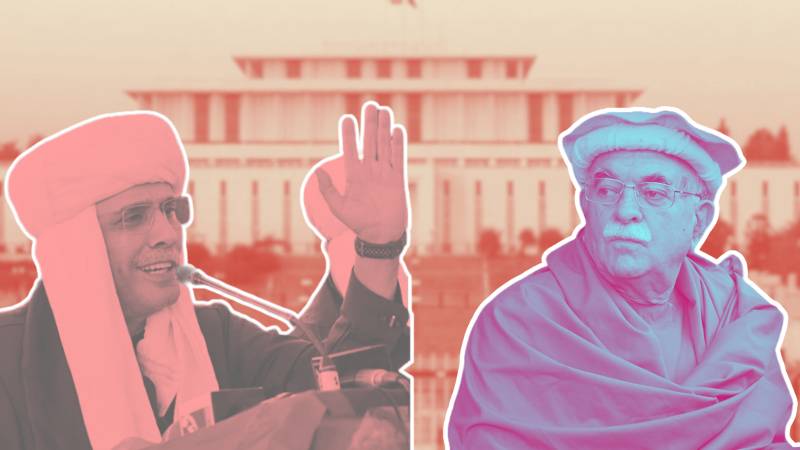
Former President and Pakistan Peoples Party (PPP) Co-Chairman Asif Ali Zardari will face off against the Pakhtunkhwa Milli Awami Party (PkMAP) Chief Mahmood Khan Achakzai for the slot of President in next week's crunch elections.
Zardari and Achakzai have both filed nomination papers for the March 9 elections.
PPP's Farooq H Naek submitted the nomination papers on behalf of Zardari to Islamabad High Court (IHC) Chief Justice Amir Farooq, who is the election's presiding officer.
Zardari's name was proposed by his son and MNA Bilawal Bhutto Zardari. Naek seconded it.
On the other hand, former Punjab governor and PTI member Sardar Latif Khosa submitted papers for Achakzai in the Islamabad High Court as the candidate for the opposition.
Achakzai's name was finalised by Pakistan Tehreek-e-Insaf (PTI) founder Imran Khan.
The papers will be scrutinised on March 4. They can be withdrawn until noon on March 5.
It is pertinent to note that, unlike elections for the prime minister, which only take place in the National Assembly (scheduled for Sunday, March 3), elections for the President are concurrently held in six parliaments of the country, this includes the upper house of parliament (the senate, the lower house of parlaiment (the national assembly) and in the respective legislative assemblies of the four provinces.
The Election Commission of Pakistan (ECP) has already issued the schedule for the President's election. It has assigned the presiding officers for each of the assemblies.
For the Senate and the National Assembly, the presiding officer will be the chief justice of the Islamabad High Court. For the provincial assemblies of Sindh, Khyber Pakhtunkhwa and Balochistan, the presiding officers will be the chief justices of the respective provinces. However, the Election Commission's Member for Islamabad will be the presiding officer for the Punjab assembly.
PPP frets allies
As the presidential elections draw near, the PPP is fretting whether it will be able to secure sufficient votes, especially in the provincial assemblies.
While the PPP demonstrated its dominance in Balochistan on Saturday after its candidate, Mir Sarfaraz Bugti, comfortably won the elections there, it is a different story in Sindh and the National Assembly, where it has some loose ends.
One major loose end is the allied Muttahida Qaumi Movement-Pakistan (MQM-P). The MQM-P is supposed to partner with the coalition government in the centre, even though it has opted to sit on the opposition benches in Sindh.
A discord has arisen after the PPP opposed some of the demands put forward by the MQM-P for seats in the centre and appointments for governor.
The party has indicated it may sit on the opposition benches in the Sindh and National assemblies.
Sindh Chief Minister Murad Ali Shah said they will speak with the MQM and convince them to vote for Zardari for the presidential slot.
The PPP also lacks support from former Pakistan Democratic Movement (PDM), ally Jamiat Ulema-e-Islam Fazl (JUI-F), which has decided to sit on the opposition benches along with Sunni Ittehad Council and PTI-backed Independents.
These could be crucial votes when it comes to the presidential elections.
End of extended tenure
Elections for a new president will see the term of the incumbent, President Dr Arif Alvi come to an end.
Alvi's five-year tenure as President technically ended last September. However, he has constitutionally continued in his position until a new president is elected.
What makes the election crucial at this stage is that half of the Senate had completed its tenure after the assemblies of Punjab and Khyber Pakhtunkhwa were dissolved while the tenure of the remaining senators is due to expire on March 11.

